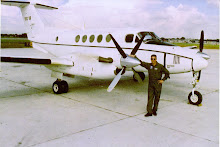Saturday, August 9, 2008
Witness to History
For those who don't know, a brief geography/history lesson. The Republic of Georgia is a former Soviet state on the eastern shore of the Black Sea. It is a relatively small country, roughly the size of Nebraska. For the past few months, the region of South Ossetia, about 40 miles northwest of Tbilisi, has been trying to break away from Georgia in an attempt to join the Russian Federation. Until recently, the uprising was limited to small armed skirmishes between Ossetian fighters and the Georgian Army, and was relatively insignificant in the grand scheme of things. As my luck would have it, that all changed the day we arrived in Tbilisi.
It seems the Ossetians, fearing being overrun by the Georgian Army, requested military assistance from Russia, and they got it in the form of hundreds of Russian tanks, and dozens of fighter/attack aircraft. The last I heard, thousands of people had been killed, several Russian jets had been shot down, and in retaliation, the Russians had bombed targets all around Tbilisi. The night before we left, they bombed an airfield just 3 miles south of the one we'd landed at. I even heard a rumor that the only reason the Russians didn't bomb Tbilisi International Airport was because our airplane was there and they didn't want to give the US any reason to get directly involved. How considerate of them...
All of the above is just to set up my real story. Obviously and thankfully, I did not experience any of the fighting or destruction first hand. What I experienced and what moved me was the reaction of the Georgian people to the news that their country was in the early stages of all out war. I was just a visitor to their nation, and I had a ticket out of town (provided they kept the airfield open...but I guarantee you we would have found a way to get out of Dodge either way), the local citizens were in it for the long haul. This was their home and their way of life, and it was under attack from one of the most powerful nations on Earth. I hope and pray none of us ever have to find out what that feels like, but if we ever do I hope we weather it with the calm and grace or these kind people.
As I've told many who were concerned about our well being, unless you watched CNN or BBC News, you would never have known that there was a real live war starting just up the road. Nobody was panicking, people were going about their daily activities, all businesses were open, it was life as usual for the Georgians. That's not to say they didn't know or understand the gravity of what was happening, everyone did, but it just did not seem to affect them in a way that caused them to alter their normal daily activities. Everyone at the hotel, from the housekeepers to the front desk clerks, to the waitresses in the restaurants had smiles on their faces. They went about their jobs as if it were just another day in paradise. One of the waitresses apologized for the "bad time", and invited us to come back again in "good time", all with a big smile on her face. Can you imagine? She apologized to us because her country was under attack? Seems a little counterintuitive, but she was sincere.
If anything, the beginning of this war brought about an outpouring of Georgian pride and patriotism. The night before we left, there was a rally in Freedom Square (formerly Lenin Square), just down the street from our hotel. Horns were honking, people were cheering, and Georgian flags were everywhere. It was an impressive display, and I realized then that David had no intention of letting Goliath get the better of them. These people truly loved their homeland, and it was inspiring.
As you might be able to guess, the Georgian people are very proud of their heritage, and very proud of their national individuality. Georgia has a long and varied history, with the first settlers arriving in the region in approximately 4000BC. Since that time, just about anyone with a cause has come thru and left their mark. The Greeks, the Romans, the Persians, the Mongols, etc, etc. The resulting culture provides a very unique experience. The majority of Georgians are Orthodox Christians, but most other religions are present and welcomed. How many places do you know of that have a Mosque on one corner and a Synogogue on the other?
Until 1988, Georgia was part of the Soviet Union, and the Soviet/Communist influence is still very evident, but evident as part of the Georgian past, not it's present and hopefully, not it's future either.
Our trip back to Iraq was uneventful, as was our entire experience in Georgia. It was only after I returned to Iraq and had a chance to watch the news in English that I realized just how perilous the situation really was/is. I never thought I would say it, but I'm glad to be back in the relative safety of Iraq.
My thoughts and prayers are with all the kind people we encountered on our brief trip to Tbilisi, and for that matter, with all the people of Georgia. May cooler heads prevail, and bring about a quick and peaceful end to this conflict.
Saturday, July 12, 2008
What's it like?
Sights:
Dusty - There is a constant dust-haze in the air here. Even on a "clear" day, there is still a brown haze. Only when you look straight up is the sky ever really blue. That's a clear day. Then there are the dust storms. They can last for weeks, but normally only stick around for a day or two. They seem to come about when strong winds off the Mediterranian sweep across Syria and Jordan, blowing the powder-fine dust off dry lakebeds. The dust is the consistancy of powdered sugar, and is carried thousands of feet in the air, and blown over hundreds of miles. It coats anything and everything, and can get so dense that visibility is reduced to just a few hundred feet and the sun is almost completely blocked out. On those days, the little bit of sunlight that filters through all the dust has an erie brownish-orange color to it, and the only thing you can smell or taste is dust. Not at all unlike when you blow the dust off a box that's been sitting in the attic for years on end.
Brown - Not surprisingly, because of the constant dust, most everything here is a tan or light brown. There are a fair amount of trees, mostly eucalyptus, but even they are coated with dust. Greens here are not the same as they are at home. They are all faded and dust coated. About 40 miles west of us is an enormous lake (About the size of Lake Mead if I had to guess), but that is the only real blue water I've seen here (aside from the Persian Gulf). The Tigris and Euphrates rivers are extremely muddy and poluted, and the water is (guess which color?) brown. Even the thousands of farm fields here in the "fertile crescent" appear brown from the air. No vibrant colors anywhere, aside from... you guessed it.... vibrant brown.
Dingy - This is a very poor country, and all the wars and conflicts in the past 50 years have taken their tolls. All the buildings here (left over from when Balad was an Iraqi Air Force base) are run down and in poor repair. In the years that we've been here, a few improvements have been made, but just those that were absolutely necessary. Utilities may or may not work, water may or may not come on (and quite often when it does, it is brown for the first few seconds), and so on. Not at all up to the standards we're used to back home. Everything is dirty, and most everything is broken in some respect and works just enough to get by.
Blast walls - They're everywhere. Large, steel reinforced concrete wall sections. They're called "T" barriers, because they're sort of shaped like an upside down "T". They're designed to contain explosions from mortar rounds or rockets. Fortunately for us, they don't get used for their intended purposes very often. They surround just about every building on base, and sometimes they even have "T" barriers surrounding other "T" barriers. They're anywhere from 5' to 20' tall and 6' to 10' wide, and you can't turn your head without seeing dozens of them. Most of them are just plain old concrete gray, but soldiers being the creative types they are, have turned many of them into concrete canvasses onto which they've painted some beautiful murals. Some are memorials to fallen comrades, some are reminders of home, some are unit insignias, and others are just the "Kilroy was here" type of mementos used to mark a brief point in time that seemed like an eternity to the creator.
Sounds:
Balad is a very noisy place. Not that any big city back home is "quiet", but there are some sounds that are unique to a military airbase in a combat zone.
F-16s - Every hour or so, the air is pierced with the sounds of F-16s taking off in full afterburner. If you've never experienced this from 1/4 mile away, you should try it once. Then imagine it happening on a regular basis, all day every day. I used to live near a railroad crossing, and remember how the train horns used to wake me up at 3am. I didn't think anything could be worse than that at the time. Now I only wish I just had to listen to trains.
Generators - Everything here on base is powered by enormous generators, and they're everywhere. You can't walk anywhere without passing 7 or 8 of them. Huge diesel engines just droning on, all day, every day.
Air conditioners - Being in the middle of the desert, air conditioners are a necessity. In our offices and in our rooms, there is always the constant din of the a/c in the background.
Explosions - Just about daily, there are large explosions somewhere on base. They're called "controlled detonations", and are the Explosive Ordinance Disposal (EOD... military Bomb Squads) teams destroying the various explosives they'd come across that day. They announce the detonations before hand, but they still get your attention even when you're expecting them.
Birds - In the satellite antenna just outside my window, a pair of mourning doves have a nest, and now have several chicks. About 6am each morning, the chicks get fed, and I get to hear all about it. It ususally doesn't bother me, as it reminds me of the sounds of home. There are also lots of sparrows, pigeons and hawks here on base. Each morning and evening, the eucalyptus trees I mentioned above sound like they're filled with chirping birds. It's actually pretty impressive just how loud they can be.
Gunfire - There are rifle and machine gun ranges somewhere on base, and every now and then we hear the distant crackle of a machine gun burst. I realized I'd been here a while when the sound of gunfire didn't even get my attention anymore.
Accents - This place runs because of "TCNs" or Third Country Nationals. They are non-Iraqi contractors that do all the various non-military jobs on base. They work in the mess halls, they clean the showers and restrooms, they drive the busses, they work in the housing office, at the movie theaters, the barber shop, the fast food restaurants and the 3-day laundry service. They come from all over the region (India, Sri Lanka, Bangladesh, Kenya, Uganda, Philippines, South Africa, just to name a few), and most have very thick accents. Granted, they all speak English much, much better than I speak their native language, but its still a challenge to understand most of them. Also, we quite regularly have to deal with foreign air traffic controllers. Like the TCNs, their English is far better than my Arabic, but it can get interesting at times.
Gravel - Pretty much everywhere on base that is not paved or concrete, is covered with gravel. It varies from small pebbles to decent sized stones, but it is everywhere and it is usually about 6" deep. They put it down in the housing areas and parking lots to try to keep the dust and mud under control. It makes a very distinct "crunch, crunch, crunch" sound when you walk thru it. Very difficult to sneak up on anyone here.
Smells:
Ah yes, all the glorious smells of a 3rd world combat zone. Where to begin?
Dust - As I previously mentioned, dust is everywhere and it has a very specific smell that is just about everywhere, except on the very clearest of days. There is no escaping it when it's bad. It wakes me up at night on a pretty regular basis.
Smoke - About a half mile away from us is a huge trash burn pit. Imagine an enormous landfill where they don't bury the trash, but burn it instead. Anything and everything gets burned, and we get to breathe the smoke. Daily. It's almost to the point that we can tell what they're burning that day, just by the way the smoke smells. Plastics are the worst. I've taken some pictures of the giant plume of jet black smoke that billows up from the burn pit. I'll post them here sometime. There is no way on Earth this would ever be allowed back home because of all the toxins and pollutants that result, but hey, we're not at home so it must be ok, right?
Exhaust - With all the generators running all over the base, it's not surprising that there is also a constant stench of diesel exhaust just about everywhere you go. It first hits when I walk outside, but by the time I get to wherever I'm going, I've gotten used to it and don't even notice anymore. Then there is the jet exhaust out on the flightline. It's everywhere, and again, after a while you don't even notice.
Pine Sol - I think the Army keeps the makers of Pine Sol in business. Every Army building I've ever been in smelled like Pine Sol. I don't know what the fascination is with it, but I sure wish they'd switch to a different floor cleanser. Enough already with the Pine Sol!
Porta Potties - They're everywhere, and they smell like, well, porta potties. To add insult to foul smells, they hardly ever put just one anywhere. Normally there are 4 or 5 together, just to ensure that everyone for a half mile downwind can sample the bouquet of less-than-pleasant aromas. Oh yeah, and there isn't much that smells worse than a porta potty that hasn't been cleaned in a week and is baked on a daily basis in 117* heat. Not fun. They should encase them in glass and write "For Emergency Use Only" on the doors.
Body Odor - Most people here smell pretty bad. Usually, it's either for job-related or cultural reasons, but whatever the cause, the result is the same. I can't go more than two days without washing my flightsuit, but apparently, many people can (but shouldn't...). Then there are the TCNs, many of whom seem to feel it is "masculine" to smell like 3 week old rotting garbage mixed with sweat (either that or they use a cologne called "Eau De Dumpster"). I'm starting to better understand how their families can send them off to work here for years on end.
Tastes:
A common question is "What's the food like?" Well, it's actually pretty normal. We have many options available to us. The most common eatery is the 4 mess halls or "dining facilities/DFACs". They're each open 4 times a day, and always have a wide variety of foods to choose from. There are different theme meals every day, and they range from Mongolian BBQ and Indian food to Surf & Turf and Italian. The menu is pretty much the same week after week, but there is enough of a variety to keep us from getting too bored with it all. In the event that we do tire of the mess hall food, our other options on base include: Taco Bell (150 yards from my room), Pizza Hut, Burger King, Subway, Popeye's Chicken, Cinnabon, McDonalds, Green Beans (a military version of Starbucks) Baskin Robbins, and a mom and pop type Turkish restaurant (my favorite). We can also get a limited amount of foods (steaks, hamburgers, soup, canned vegetables, bread, etc) to cook in our rooms, altho most rooms are not set up for cooking aside from having a microwave. Most of the fast food tastes pretty close to the way it does back home, which I guess is the point.
Activities:
What is there to do on base? Well, aside from eating and sleeping, we actually are offered lots of options to pass the little spare time we do have.
There are three major recreation centers on base, and each offers various and assorted activities. From Bingo and Poker to video games and ping pong, you can generally find something to do 24 hours a day.
There are several nicely equipped gyms on base.
There is a huge movie theater, which aside from the ballistic shields around it and the fact that it's free to get in, could pass for any theater back home. They play two different first run movies during the week, and three on weekends. They also have various USO concerts and activities there.
There are two pools here, one indoor, one outdoor. The outdoor pool was formerly used to train the Iraqi Olympic swim and diving teams.
There are three exchanges (military version of Wal Mart) on base, and you can usually get just about anything you want, just not when you want/need it. For example, right now it's 117* outside, and it's a great time to stock up on sweat pants, jackets and thermal underwear. Come winter, you won't be able to find those things, but you can get a great deal on shorts.
There are several chapels on base, and there are services for just about every faith imaginable.
If all else fails and you can't find anything else to do here on base, you can always go back to work.
Friday, June 6, 2008
Transitions
Being an Army Reservist, I get the unique opportunity to switch back and forth between my military and civilian personas, and I’ve always thought the process of doing so was fairly interesting, so I thought I'd share it here.
It’s not really a “scheduled” transition so to speak, more of a mental changeover that just sorta happens. Going home on leave, I started out in Kuwait with 300 other people who couldn’t wait to get home to friends and family. We were in full military mode at this point, seeing as we’d all been deployed for many months and been surrounded by nothing but uniforms the entire time.
Our first dose of civilian life came as we boarded the airplane to head home. The flight crew was the first group of non-contractor civilians we’d seen in many months. They treated us as people, not as soldiers (there is a difference…those who’ve been there know what I mean.) Our civilianization had begun.
The next step was getting off the plane in Atlanta, 16 hours after we’d left Kuwait. This was the first time I’d been back on US soil in 7 months, but it didn’t take long to get used to all the sights and sounds again. We also had some interaction with civilian passengers in the terminal, many of whom came up to shake our hands and thank us. It was good to be back in the US.
When we got to Dallas (the 3rd stop on my way home), we were welcomed by the wonderful volunteers from the DFW USO. There were hundreds of people lined up to shake our hands, high 5 and hug us as we headed out of the terminal, and it is an experience I will never forget. I now know what a movie star feels like on the red carpet, and it was humbling to say the very least.
Dallas was where we left the military charter flight and went on to regular scheduled airlines to our individual destinations. I was one of two soldiers on my flight from DFW to Phoenix, and again we were treated like royalty. For two rows around me, people were offering to buy my lunch (I’d eaten 5 times by this point), give me their pillows and blankets, or whatever else they thought I needed. In case I’ve not said it recently, I am so very grateful to all those who are grateful for what we do. Thank you.
By the time I got to the curb in Phoenix, I was the only one in a military uniform. My transformation was nearly complete. In a little over 28 hours, I’d gone from a sea of green suits to being surrounded by civilians, and it was rubbing off. I arrived home and within 10 minutes, was in shorts and a T-shirt that didn’t say “Army” on them. I was ready to be a civilian for a while, and boy did I enjoy it. I will try to write about all my wonderful leave experiences in the near future, but I want to make sure I have the time to do it properly, so it will have to wait until things settle down a little.
The civilian to Army transition was pretty much the same as above in reverse. It began when I put the uniform on for the first time in 2 weeks, and ended 40 hours later when I stepped off the plane back in Kuwait and was hit square in the face by the dust filled 105* heat.
I am eagerly awaiting the opportunity to write about my next transition, which will take place in about 3 ½ months. It can’t come soon enough, but I know that the time will pass quickly. We’re on the downhill side of the clock now, and to quote a popular Army phrase, I can do that time “standing on my head”.
Tuesday, June 3, 2008
This Time Vs. Last
Last time was the first time I’d ever been away from home for such an extended period. This time, I’ll only be gone half as long. Last time, I was going into the unknown and the apprehension was palpable. This time, I am returning to a known entity and aside from the ever present frustrations of dealing with the hurry-up-and-wait method the government seems to choose for transporting masses of people, there was little or no stress involved. I was just along for the ride and whatever happened en-route was ok with me. Last time, our exact departure date and time was uncertain until the very last minute, and Jamie and Jaislyn were there with me, so it was very stressful and hectic. I didn’t want to leave them until I absolutely had to, but nobody knew for sure when that would be, so we sat by the phone and waited. This time, I knew before I even got home when I would be leaving, so we could plan our time together accordingly. Still the most difficult thing I’ve ever done was kissing Jaislyn goodbye this time. She’d just gotten used to having me back in her life, and now I was leaving her all over again. We’d talked to her about it beforehand (complete with a deployment-themed Elmo dvd...Thanks MilitaryOneSource!), and she knew that I was only going to be home for a short time, but that didn’t make it any easier, at least not for me. Last time, I’d never been gone that long so she had no frame of reference. This time she knew what it was like to have me gone for a long time. Not easy.
On a positive note, there is a definite sense of calm today that I did not have 7 months ago. Today, I am just headed back to work. Back then, I was “Going off to war”, complete with all the drama that goes along with such an endeavor. I know now that my “war” and the war we see on TV every day are thankfully, two very different things.
Something else strikes me as I sit here waiting and people watching: I can’t help but notice the two parallel and somewhat ironic realities that I’m currently straddling. All around us, people are going about their daily activities. For the most part, they’ll all return to their own homes, their families and sleep in their own beds. I’ve seen and heard people complaining about this and that. Things that 8 months ago, I too probably would have wasted the energy complaining about, but now seem far too insignificant to worry myself over. Then there is the group of soldiers I’m traveling with. We’re all headed to various and assorted unpleasant parts of the world to do various and assorted, often unpleasant jobs, yet I hear all sorts of laughter. I often wonder if the civilians around us know how much we’d love to change places with them, even the seemingly miserable ones. I’d bet most of them have no clue, but that’s ok.
Until today, I’d never seen or met any of the people I’m traveling with, yet there is a sense of “family” among us. I know that I can go up to anyone wearing this uniform, and they will help me in any way they can, and they in turn can expect the same of me. We talk to complete strangers like we’ve known them for years. That is perhaps my favorite thing about being in the military, no matter where you go or who you are, we take care of our own and look out for each other. Perhaps it stems from our common experience, or because we share a mutual respect for anyone that is willing to put on the uniform and step up to the proverbial plate, but whatever the reason, that sense of belonging is always there, no matter when or where. I can’t help but think if people out in “the world” treated each other with the same sort of respect, the world would be a much different and far better place.
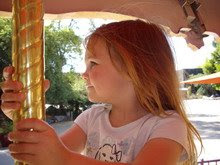
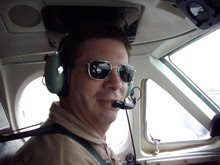
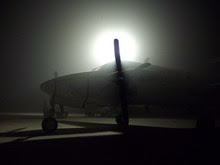
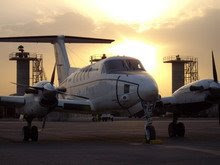
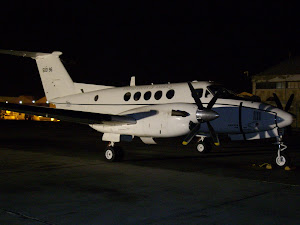
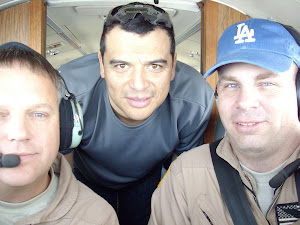
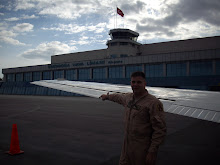.jpg)
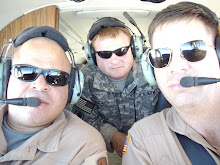.jpg)
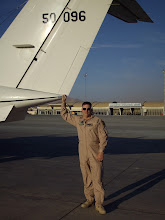.jpg)
